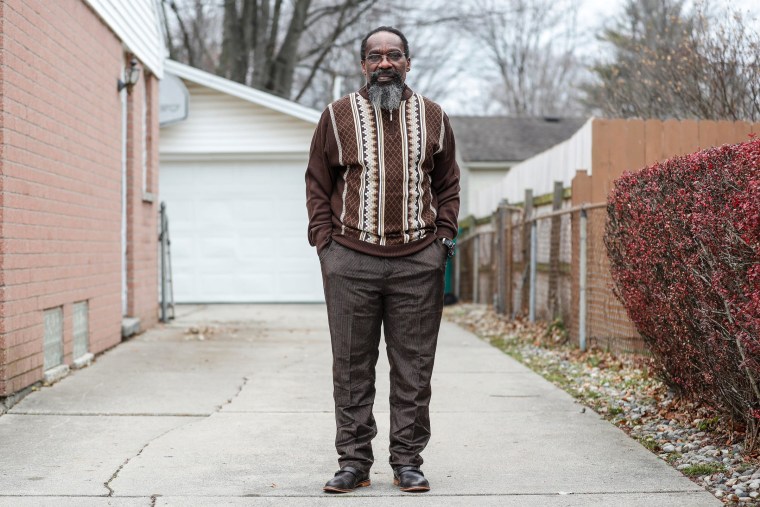A Michigan man who spent nearly four decades in prison for a crime he didn't commit insists he won't hold grudges and will only look forward to enjoying his newfound freedom.
Walter Forbes is spending his first Christmas at home with loved ones since the early Reagan administration following his exoneration in a deadly 1982 arson.

A key witness against Forbes admitted she lied on the stand, leading a judge to toss out his conviction and prosecutors electing not to retry him. He walked out of Kinross Correctional Facility a free man Nov. 20.
The soft-spoken Forbes said harboring any ill will would detract from a life he plans to enjoy in the next several decades.
"Staying bitter would only rob me of my present and of my future," he told NBC News on Friday.
The 63-year-old said he never lost hope in all the years, believing some court, someday, would believe in his innocence.
"Knowing I could do it, just knowing that" helped him stay sane while in custody, Forbes said.
Forbes was a student at Jackson Community College in 1982, studying drafting technology in hopes of a career in real estate development or construction.
Then one night, he broke up a fight outside a bar involving a Jackson resident, Dennis Hall, Forbes' lawyer Imran Syed, an assistant director of the Michigan Innocence Clinic, said.
Hall, angered that someone would intervene in the brawl, allegedly shot and wounded Forbes the next day. That would turn out to be a particularly painful moment for Forbes, because Hall died in an arson a month later and the community college student was suddenly a prime suspect.
And when witness Annice Kennebrew, then a 19-year-old mother of two who was a distant relative of Hall's, told investigators that she saw Forbes setting the building on fire, that testimony proved crucial to his conviction.
For years, investigators and law school students with the Michigan Innocence Clinic worked up a relationship with Kennebrew before she admitted in a 2017 affidavit that she lied on the stand. The statute of limitations has long run out against a possible perjury case against her.
Kennebrew said in her testimony that she lied about seeing Forbes setting the fire because two men had threatened her into doing so.
"That man is in there really for nothing, for something that he hasn’t done and I’m old enough now to know better, you know?" Kennebrew told Jackson County Judge Thomas Wilson on May 14.
"I’ve been wanting to do this, I’ve been holding it in for all these years and when the Innocent people first came to me, I was pushing them away from me, I denied them for years, I ignore them people for a long time, and when they came back to me again, I just went on and told them the truth."
Syed said he believes the now-deceased owner of Hall's building set that deadly 1982 fire. That building owner ended up being convicted in a neighboring county of an arson and insurance scheme in 1990, according to Syed.
As a wrongfully convicted inmate, Forbes is now due to be compensated $50,000 for each year he spent in state prison. It's a lengthy administrative process and he probably won't see any money until mid-2021, according to his lawyer.
"Thirty-eight years is an incredibly long time. He lost most of his 20s, his entire 30s, 40s, etc. " said Syed, who took on Forbes' case just months after graduating from law school in 2011.
"When you think about all the things we accomplish in those eras of our life, suddenly $1.8 million doesn't sound like that much money. I don't know if even $100 million or $200 million would be enough to take away the prime 40 years of your life."
For the time being, Forbes said he's enjoying time with family and is marveling at modern life, particularly "the ease of communications and technology."
He has an Android phone and an email address, has spoken to loved ones via videochatting apps, is learning how to send text messages and is weighing whether he wants to give Facebook or Twitter a try.
When asked what he found to be the most stunning new element of 21st century America, a laughing Forbes blurted out: "This might seem weird: But weed is legal."
Today's widespread legalization of recreational or medicinal marijuana is a far cry from the early 1980s when Forbes was a young man and the first lady of the United States dared young people to opt against drug use — particularly marijuana — and supported her husband's war on drugs.
"I remember that, Nancy Reagan would say, 'Just say no.' " Forbes said with a chuckle.
President Ronald Reagan’s war on drugs was just ramping up when Forbes went away for the deadly arson. It’d have decades of impact on the lives of Black Americans, with Black people getting arrested on marijuana charges at much higher rates than white people.
Also while he was away, seat belts became mandatory in every state — though Forbes said he's still surprised every time a car reminds him to buckle up.
"I know what gets me still is the alarm for the seat belts," he said. "They'll be going off if I don't put it on, 'Put your seat belt on.' "

